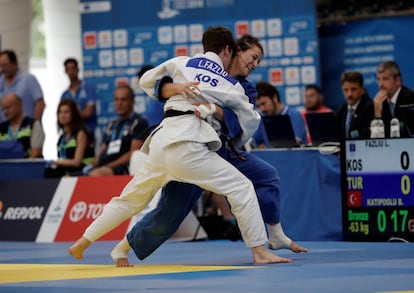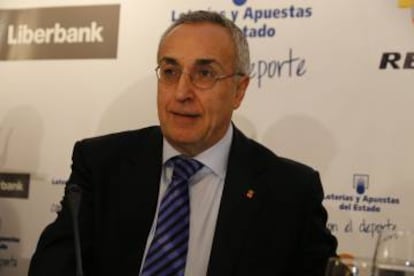Spain’s position on Kosovo could hurt its chances to host major sports events
International Olympic Committee says it will encourage international federations not to host competitions in Spain unless Kosovar athletes are allowed there under their own flag

Spain, together with Greece, is the only large European country that does not recognize Kosovo, which proclaimed its independence from Serbia in 2008. While this measure might make sense from Spain’s point of view in light of the secessionist bid in Catalonia, it is endangering its own influence and prestige in international sports, and could even undermine Spanish aspirations to organize major events.
A high-ranking official with the International Olympic Committee (IOC) said letters would be sent out to all international federations, suggesting they should avoid hosting international sports competitions in Spain unless Kosovar athletes are guaranteed permission to participate under their own flag and national anthem.
We should warn all international federations that, until this is solved, they should not hold international competitions there
Pere Miró, IOC deputy director
“If the Spanish Government are [sic] not in the conditions to guarantee the access not only to Kosovo but to every athlete to compete, we should warn all international federations that, until this is solved, they should not hold international competitions there,” said Pere Miró, the IOC deputy director and head of National Olympic Committee (NOC) relations, in an interview with the news website insidethegames.biz.
Government sources expressed surprise at the possibility that the IOC could consider not hosting international events in countries that do not recognize Kosovo, which also include Russia, China, India and Brazil. These sources questioned the statements made by Miró, who is a native of Catalonia.
The Foreign Ministry said it has no official information that the IOC may be planning to change its position regarding the participation of Kosovar athletes in countries that do not recognize the country’s independence. A spokesman for the Diplomatic Information Office said that in countries that do not recognize Kosovo, these athletes are allowed to participate under the flag of the Kosovo Olympic Committee.
Karate competition
“In this situation, it is impossible for Spain to organize anything,” said Alejandro Blanco, president of the Spanish Olympic Committee (COE), following a week that was marked by the Kosovo delegation’s problems at the Karate World Championships in Madrid. Kosovar athletes were allowed to compete bearing the initials of their federation, KKF, on the back of their uniforms, but the scoreboards showed them as “World Karate Federation (WKF) 5” and both their anthem and flag were banned.

IOC official Pere Miró told insidethegames.biz that the IOC was unable to act against Spain ahead of the karate championship despite knowing that Kosovar athletes would have problems.
“We cannot suspend a country and we cannot say they cannot organize events there,” he said. “But we are totally ready to say, and this is what we will say now, IFs [international federations], please before awarding any competition, make sure you have all the guarantees that all athletes will be welcome in Spain.”
COE chief Blanco said the situation at the karate championships was a step backwards from the recent Mediterranean Games held in the Catalan city of Tarragona, where athletes from Kosovo officially participated as the National Olympic Committee of Kosovo. A similar agreement allowed Kosovo to participate in the 2016 Olympic Games in Rio, despite the fact that Brazil does not recognize the country’s independence.
“In all countries of the world, save for Spain, Kosovars compete without problems, with the same rights and guarantees as other athletes,” said Blanco, adding that neither the IOC nor the international federations are questioning or assessing Spain’s political position on Kosovo. “We have to respect the laws and the government’s decisions, naturally, but also those of the IOC and the federations. The sporting world cannot accept for everyone, except Kosovo, to be represented at a competition.”
Blanco admitted that the Olympic movement is discussing the problem with the Spanish government. The IOC and a majority of international federations recognized Kosovo in 2014.
English version by Susana Urra.
Tu suscripción se está usando en otro dispositivo
¿Quieres añadir otro usuario a tu suscripción?
Si continúas leyendo en este dispositivo, no se podrá leer en el otro.
FlechaTu suscripción se está usando en otro dispositivo y solo puedes acceder a EL PAÍS desde un dispositivo a la vez.
Si quieres compartir tu cuenta, cambia tu suscripción a la modalidad Premium, así podrás añadir otro usuario. Cada uno accederá con su propia cuenta de email, lo que os permitirá personalizar vuestra experiencia en EL PAÍS.
¿Tienes una suscripción de empresa? Accede aquí para contratar más cuentas.
En el caso de no saber quién está usando tu cuenta, te recomendamos cambiar tu contraseña aquí.
Si decides continuar compartiendo tu cuenta, este mensaje se mostrará en tu dispositivo y en el de la otra persona que está usando tu cuenta de forma indefinida, afectando a tu experiencia de lectura. Puedes consultar aquí los términos y condiciones de la suscripción digital.








































